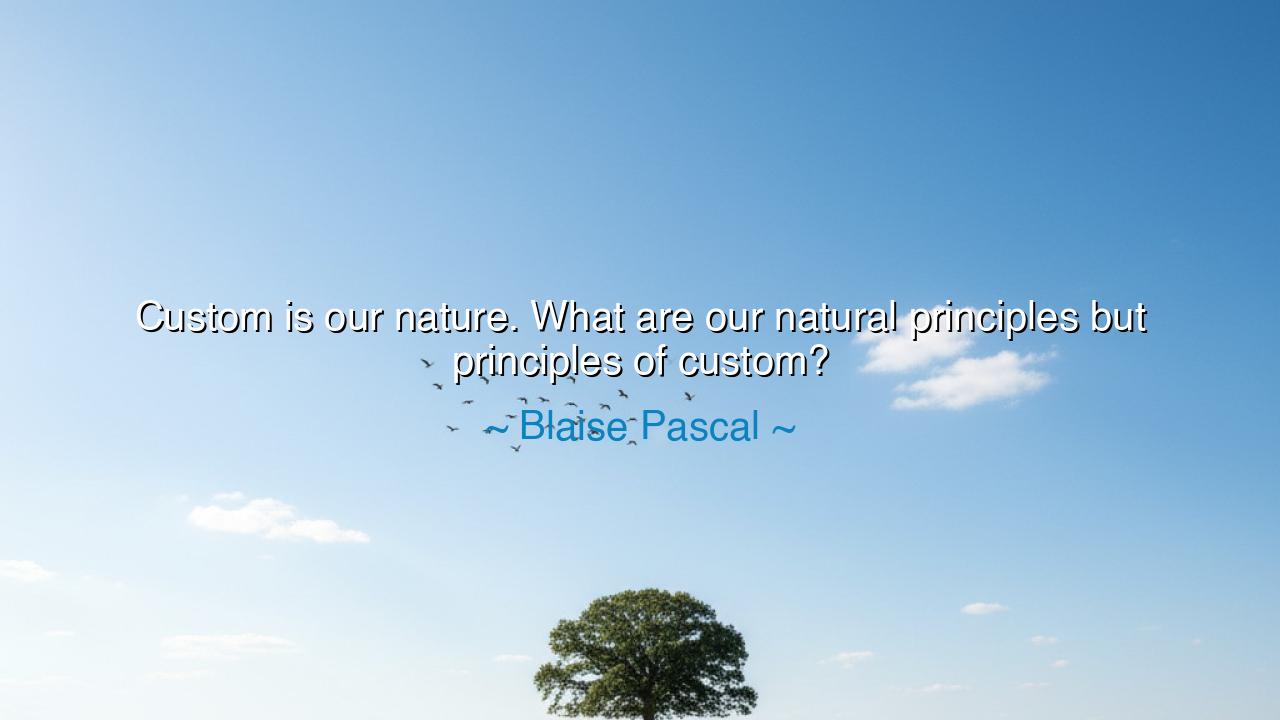
Custom is our nature. What are our natural principles but






Hearken to the words of Blaise Pascal, philosopher of the eternal paradoxes of man: “Custom is our nature. What are our natural principles but principles of custom?” At first these words seem strange, for do we not think of nature as fixed and eternal, while custom is fleeting, shaped by time and place? Yet Pascal, with piercing vision, reveals to us that much of what we call natural is but the habit of our people, the rhythm of our culture, the weight of repeated practice. What we think to be eternal truths may in fact be only the echo of customs so deeply ingrained that they feel like nature itself.
Consider how the child, born with a mind as fresh clay, is shaped by the hands of custom. The tongue it speaks, the manners it practices, the gods it worships, the food it desires—all these are learned, repeated, and made second nature. With time, the child says, “This is what is natural to me,” not knowing that much of it is the inheritance of countless generations before. Thus, Pascal reminds us that our so-called principles may not be the dictates of heaven or the laws of biology, but the training of tradition repeated until it seems innate.
History gives us many examples. In ancient Sparta, courage in battle was seen as the highest virtue, and even young boys were trained to endure hunger, pain, and hardship as if it were their nature. In contrast, the Athenians prized eloquence, philosophy, and the arts, believing these to be the natural pursuits of free men. Which of these, then, is the true nature of man? The answer is revealed in Pascal’s insight: both are not eternal truths, but customs elevated to the level of principle. What one people sees as natural, another may find foreign.
This realization humbles us, for it shows how easily we mistake the familiar for the universal. Many once believed it was natural to divide society into masters and slaves, men and women of unequal worth, noble and common. These were not laws of nature, but chains of custom. When new voices rose to challenge them, humanity discovered that what was called “natural” was merely habit hardened into law. In this we see both the danger and the opportunity: if custom binds us, it can also be reshaped, and with new customs, a new world can be born.
The meaning here is not to despise custom, for it is the soil in which the tree of society grows. Without shared practices, life would be chaos. Yet we must be vigilant, lest we mistake the soil for the root, the habit for the eternal. To live wisely is to question which of our “natural principles” are truly born of human essence, and which are merely the clothing of habit. Only then can we live freely, neither enslaved to blind tradition nor rootless in the name of endless change.
The lesson, then, is clear: examine your customs, and do not accept them unthinkingly as your nature. Ask yourself: “Do I believe this because it is true, or because it has always been done this way?” If it is the latter, then you have discovered the hidden chains of habit. Break them if they do not serve justice, and forge new customs that align with truth and virtue.
Practical actions flow from this teaching: observe your daily rituals and traditions; question them; discern which uplift the spirit and which enslave it. Read the lives of other peoples and nations, so that you may see how different “natures” arise from different customs. Practice the art of deliberate choice, making your habits serve your values rather than dictate them. In this way, you may transform blind repetition into conscious tradition, and unconscious submission into noble freedom.
Remember always: custom shapes our nature, but our will can reshape our custom. The power that forged our principles can also refine them. Let us therefore live not as prisoners of habit, but as masters of it, building customs that bring forth justice, wisdom, and joy. For in shaping our customs, we shape our very nature, and in shaping our nature, we shape our destiny.






AAdministratorAdministrator
Welcome, honored guests. Please leave a comment, we will respond soon